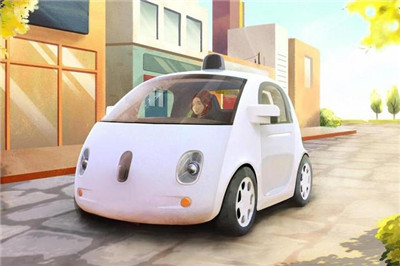On Wednesday morning, during Google’s annual meeting, a shareholder named John M. Simpson stood up to question the company’s top executives about its self-driving car program. They were not friendly questions.
周三早上,谷歌(Google)举行年会时,一位名叫约翰·M·辛普森(John M. Simpson)的股东站起来,向公司的高管提问关于自动驾驶汽车项目的问题。这些问题可并不友好。
Simpson, 67, works for a nonprofit called Consumer Watchdog, where he directs its Privacy Project. In recent years, he has focused largely on Google, which, he told me, he hopes to prod into “being more respectful of people’s privacy when they do business.” Owning Google stock allows him to ask questions at the annual meeting.
67岁的辛普森供职于一家名为消费者监督(Consumer Watchdog)的非营利机构,是该机构隐私项目(Privacy Project)的主管。近几年来,他基本上都在关注谷歌,他告诉我,他希望督促这家公司“在经营业务时更尊重人们的隐私”。由于持有谷歌的股份,他可以在一年一度的会议上提问。

In the run-up to this week’s meeting, Simpson issued a string of press releases critical of Google’s self-driving vehicles. He feared that Google would collect data from car owners, stripping away even more of people’s privacy. He noted that Google’s “autonomous cars,” as they’re called, have been involved in 11 accidents (two recent fender-benders brings it up to 13). He listed what he said were the technology’s flaws: for instance, that it can’t make out hand signals from a driver in another car.
在本周的会议召开之前,辛普森发表了一系列新闻稿批评谷歌的自动驾驶汽车。他担心,谷歌会收集车主的数据,盘剥人们更多的隐私。他注意到,已经有11宗事故(算上最近的两次剐蹭,共有13宗)都涉及谷歌的所谓“自动汽车”。他提到了一些在他看来属于技术缺陷的问题,例如,不能理解另一辆车中司机做出的手势。
Finally, Simpson noted that Google — and Google alone — envisions cars that have no steering wheels or brakes, cars where everyone is a passenger. Simpson views this as Google’s hubris, pointing out that other car companies view self-driving technology as a complement, not replacement, for the driver. “We think there always needs to be the ability of a human to take over if need be,” he told me. Having looked into it more closely, I’ve come to the opposite conclusion.
最后,辛普森提到,谷歌——只有谷歌——构想的是一种没有方向盘、没有刹车的汽车,所有人都是乘客。辛普森认为,这是谷歌的傲慢。他指出,其他汽车公司认为,自动驾驶技术对司机是一种补充,而不是替代。“我们认为,让人类在必要时控制车辆,这一点总是需要的,”他告诉我。在更仔细地研究过这一问题之后,我得出了相反的结论。
Google’s effort to build a self-driving car is part of the division called Google X, led by a scientist with the too perfect name of Astro Teller. The goal of Google X is to attempt “moonshots” — efforts that require a radical solution that, if they succeed, would solve a huge problem (while making a nice return for Google, of course). The big problem self-driving cars could help solve, said Teller in a recent speech, is the “1.2 million people who die every year in car accidents.”
谷歌制造自动驾驶汽车的项目,是一个称作Google X的部门开展的。领导这个部门的科学家有一个再合适不过的名字,叫做阿斯特罗·泰勒(Astro Teller,意为“星际揭秘者”——译注)。Google X的目标是尝试“瞄准月亮开炮”——这样志存高远的项目需要激进的解决方案,如果成功的话可以解决重大问题(当然也可以为谷歌带来丰厚的回报)。泰勒在最近的一次演讲中说道,自动驾驶汽车可以解决的重大问题是,“每年在行车事故中有120万人丧生”。
During the six years Google has been working on self-driving technology, its cars have been taught to understand how to traverse the roads. With their combination of robotics, sensors and computing power, they know how to stop at a stop sign, look for oncoming pedestrians, change lanes, get on the freeway and anticipate all the various problems that drivers face.
在谷歌研究自动驾驶技术的六年时间里,研究人员已经让谷歌汽车学会了在马路上如何通行。通过综合运用机器人技术、传感器和计算能力,这些汽车懂得怎样在停车标牌前停车、注意走来的行人、变道、驶入高速路,并为司机遇到的各种问题预先做好准备。
Using retrofitted Lexuses, Google has driven a million miles autonomously. More recently, it has built several dozen small cars without steering wheels and brakes and is ready to test them in the streets of Mountain View, Calif. (though the State of California is insisting that Google add a steering wheel and brakes to the cars it sends out for this experiment).
谷歌使用经过改装的雷克萨斯(Lexus)汽车,已经自动驾驶了100万英里。最近,谷歌还制造了数十辆没有方向盘和刹车的小轿车,而且已经准备好在加利福尼亚州山景市(Mountain View)的街道上进行试驾。(不过加州参议院坚持要求谷歌在开上街头试驾的车辆中,增加方向盘和刹车。)
It’s true that Google is alone in envisioning a world of completely driverless cars, while other car companies see self-driving technology as merely an extra feature that can be turned off. Google’s conclusion is not the result of hubris, however. Unlike its new cars, the retrofitted Lexuses also allow for human driving.
的确,只有谷歌在构想一个汽车完全无人驾驶的世界,而其他汽车厂商认为,自动驾驶技术只是一个可以关闭的额外功能。但是谷歌得出这样的论断并不是因为傲慢。不像谷歌新制造的汽车那样,改装的雷克萨斯也允许人类驾驶。
Google realized that when people had the ability to drive autonomously, they paid less attention to what they were doing. “People don’t even pay attention to driving when they are driving,” said Teller. The cars, which have 360-degree vision and can “see” much further ahead than humans, were at their safest when people didn’t have the option of taking the controls.
谷歌发现,尽管人类有自主驾驶汽车的能力,但他们对自己正在做的事情付出的注意力更少。“人们在开车的时候,甚至都不去注意与开车相关的事情,”泰勒说。这些汽车有着360度的视野,可以“看到”的距离远比人类远,不提供让人类控制的选项,反而是最安全的。
Alain Kornhauser, a self-driving car expert at Princeton University, pointed out to me that when the auto companies install autonomous features to aid drivers, it won’t be the humans who escape accidents by taking over from the technology — which is what Simpson assumes. Rather, the technology will step in to override human error.
普林斯顿大学(Princeton University)的自动驾驶汽车专家艾伦·科恩豪泽(Alain Kornhauser)指出,汽车厂商为了辅助驾驶员而安装了自动驾驶技术,但这不是像辛普森所设想的那样,让人类从科技手中夺过驾驶权,进而从事故中脱身,而是让技术介入,纠正人类的错误。
Google notes that in every accident its cars have been involved in, all of them minor, the self-driving cars have never been at fault — except on the one occasion when a Google driver took the controls. And all the “flaws” Simpson notes are things that Google has either solved or is in the process of solving.
谷歌提到,涉及该公司汽车的事故都是小事故,而且任何一起事故中,自动驾驶汽车都没有责任——只有一起除外,而那次事故中谷歌的驾驶员掌握了方向盘。而且辛普森提到的所有“缺陷”,谷歌不是已经解决,就是正在解决过程中。
At the annual meeting, Simpson asked Google if it would pledge not to use any customer data it gathers from driverless cars for marketing purposes. David Drummond, the company’s general counsel, ducked the question, saying it was too early to make any such pledge. Simpson also asked Google to release the accident reports. In truth, Google has released plenty of information about the accidents, and on Friday began issuing monthly reports that include descriptions of accidents.
在年会上,辛普森询问谷歌,是否愿意承诺,不将无人驾驶汽车中搜集的顾客数据用于营销目的。谷歌首席法务官戴维·德拉蒙德(David Drummond)回避了这个问题,称现在做出任何此类承诺都为时过早。辛普森还要求谷歌公布相关的事故报告。实际上,谷歌发布了很多关于事故的信息,而且开始在周五发布月度报告,其中包括对事故的描述。
Simpson and other consumer advocates are right to press Google — and all the big tech companies — on privacy issues. The profligate use of our data has become a big concern for many Americans. But on the question of whether Google should be promoting completely autonomous cars, he couldn’t be more wrong. The sooner they are a reality, the safer we’ll all be.☐
辛普森和其他消费者权益倡导人士就隐私议题向谷歌(以及所有大型科技企业)施压是正确的。对我们的数据的恣意使用,已经成了许多美国人担心的大问题。至于谷歌是不是应该推广完全自动驾驶的汽车,他真是大错特错。它们越早成为现实,我们大家就越安全。













